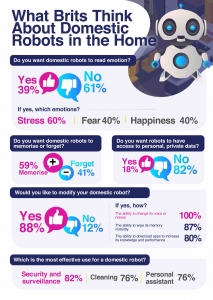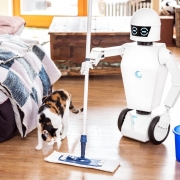Domestic Robots – Do YOU trust them?

7 in 10 Americans would totally trust a domestic robot to do their chores, according to Yahoo.
Yet, what about Brits? How do we feel about domestic robots?
(A domestic Robot is an autonomous Robot that is primarily used for household chores)
Specops Software wanted to find out how we Brits felt about robots doing chores so surveyed 2,424 British consumers. They found out something quite the opposite to our American counterparts.
The survey consisted of the questions based on the characteristics of domestic robots. Specops wanted to identify the elements British people believe would make “ideal” robot for the home.
Some of their findings included:
- 61% of people do not want domestic robots to read emotion
- 88% of Brits would like the ability to modify their domestic robot
- 39% of Brits would be likely to purchase a domestic robot, if available now
- 82% of people would prefer a domestic robot with gender neutral characteristics
- 82% of people do not want domestic robots to have access to personal, private data
So it looked like us Brits don’t like the idea of Robots doing our chores for us! With many of the statistics being based around privacy based concerns such as reading emotion and access to private personal data.
So, 77% of Brits do not want human-like robots in the home and:
- 61% of people do not want domestic robots to read emotion
- 88% of Brits would like the ability to modify their domestic robot
- 39% of Brits would be likely to purchase a domestic robot, if available now
- 82% of people would prefer a domestic robot with gender neutral characteristics
- 82% of people do not want domestic robots to have access to personal, private data
Domestic Robots Emotion
The most interesting statistic that Specops found was that 39% of Brits agree that it would be an asset for domestic robots to be able to read emotion. With the most favourable emotions ranking as most favourable to be read:
- Stress (60%)
- Fear (40%)
- Happiness (40%)
Functionality wise, 59% of Brits would like domestic robots to memorise what they see and do. While 41% would prefer robots forgot what they see and did instantly.
Aesthetics
But how do we want our robots to look? Well us Brits want domestic robots to look:
- Mechanical (65%)
- Be neutral in colour (53%)
- Have round, soft edges (29%)
- Be small and compact (53%)
While, a whopping 82% of people surveyed would like a domestic robot to have gender neutral characteristics (male 6% / female 12%)
We would also like to be able to modify the domestic robot if it were to exist (88%) most favourable modifications:
- Ability to change its voice or noises (100%)
- Wipe its memory instantly (87%)
- Download apps to increase its knowledge and performance (80%)
- Extend or add different parts (60%)
- Change its “skin” / outer casing (27%)
- Zap or radiate when touched by something unknown (7%)
82% of us believe that the most effective use for a Robot is for security and surveillance.
Cleaning and use as a personal assistant came in a close second at 76%. Entertainment ranked 3rd at 65%, Cooking 53% in at 4th, companionship ranked 5th at 35%, furthermore guidance and advice 6th at 24%, healthcare 7th at 18% and Childcare came last at 6%
So, keep up to date with everything How To Kill An Hour by signing up to our newsletter by clicking here!
Also, let us know what you think of the show by clicking here!
Furthermore, Click here to subscribe to our YouTube Channel to see more amazing ways to kill time!
While you’re there, follow us on Twitch by clicking here!




